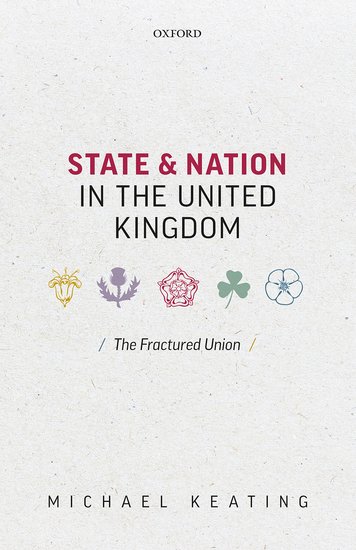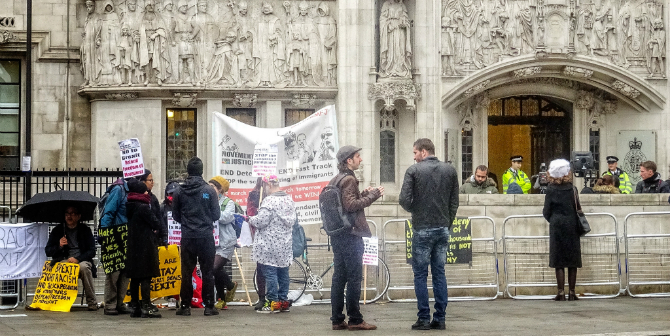Brexit has removed the EU as an external support system that prevented devolution from escalating and undermining the union. In this edited extract from his new book, State and Nation in the United Kingdom: The Fractured Union, Michael Keating (University of Aberdeen) warns that the Conservative Party’s vision of the UK as a ‘unitary state’ might fracture it even more.
The UK’s union was never a unified project or ideology but rather a complex structure with numerous strands, which sometimes cohere and sometimes pull apart. To recall the metaphor in the book’s title, it is a bone structure that can survive multiple partial fractures as long as they do not all accumulate in the same place. That happened in Catholic Ireland in the early twentieth century, where a counter-project gained sufficient traction to triumph, but without resolving the national question definitively.
At one level, the union rests upon deep social forces, including economic forces and social structures. It is not difficult to list centrifugal forces in the early twenty-first century. Welfare state restructuring has emptied the concept of social citizenship of much of its meaning. Economic disparities have increased in the absence of state-wide policies aimed at spatial cohesion, although the disparities do not map clearly onto the boundaries of the component nations. Devolution has set in train institutional dynamics which critics predicted could lead to the weakening and, eventually, dissolution of the bonds of union. Scotland and, to an increasing extent, Wales have emerged as distinct political communities with their own political agendas; Northern Ireland has long been a place apart. Until the 1970s, there was a British party system, which even extended partially into Northern Ireland. Now there are distinct systems, and in Scotland as well as Northern Ireland the principal line of division is over the Union itself. Above all, Brexit has removed an external support system which filled some of the abeyances in the devolution settlement and provided important elements of economic union. None of these, on its own, is fatal.
The United Kingdom remains a highly integrated economic zone even though the single market was larger, and more strongly institutionalized, within the European Union. Reserved welfare powers do guarantee equity and protection against risk across the Union, if the insistence that the welfare state itself depends on the Union is, at least, exaggerated. There are fiscal transfers to all three devolved territories even they do depend on historic legacies and political bargaining, not on any calculation of need (with the partial exception of a guaranteed floor for Wales). As for shared ethos and British values, these are not the property of the British or of unionists but universal values also shared by peripheral nationalists. There is no evidence that fundamental values are diverging significantly or are under any more threat at the periphery than at the centre—unlike during the Stormont regime. There remains a strong substratum of British identities rooted in history, shared experience and values but this, as always, is a polyvalent phenomenon, negotiated differently across the UK with moments of common endeavour such as the Second World War but also distinct stories and memories.
At another level, the Union rests upon conjectural factors, critical moments and political shifts, which can change matters over short periods. International and historical experience shows that, in these conditions, specific events can result in rapid change. The Easter Rising of 1916 and its aftermath precipitated a shift to radical Irish nationalism. A very different event, the establishment of the National Assembly for Wales, shifted the constitutional ground there very rapidly. Inchoate English discontents was one of a set of elements that crystalized into outright rejection of EU membership by a majority of the population once that option was presented. The Union has come under most intense challenge in recent years from nationalisms in Scotland, Northern Ireland and Wales. Surveys since the Scottish independence referendum have provoked some sensationalist headlines but show that substantial numbers of people believe that the union will end within the next twenty years. Yet Brown et al. (1999) found back in 1997 that 60 per cent of Scots thought that Scottish independence was likely in the following twenty years; twenty years later, the expectation was much the same. Irish unification is also viewed differently depending on whether it is presented as a long-term prospect or an imminent proposition. The reason is that, in the absence of an external shock, it has hitherto been possible to accommodate nationalist pressures by conceding autonomy and ingenious arrangements such as the Northern Ireland settlement. It was the failure to concede Home Rule that provided the opportunity for Irish separatism in the early twentieth century.

Between the deeper forces and historical conjunctures is statecraft, in which leaders read long and short-term change and respond more or less skillfully. The Millennium settlement was an effort to restabilize the union at a different point from the old territorial management formulas, providing a new balance between centre and periphery. It is, as we have seen, subject to different interpretations, themselves rooted in contrasting historical perspectives. Two features stand out: the failure to change constitutional understandings and practices at the centre; and the continued position of England as the dominant partner, but constitutionally unrecognized as such. The settlement as a whole, while described as a constitutional reform, was very weakly constitutionalized. Not only was the principle of Westminster sovereignty and supremacy conspicuously asserted as a legal principle. The settlement was not scaffolded with wider and deeper understandings of constitutionalism as theory and practice. Conventions were invoked as a way of squaring the sovereignty circle but then reduced to mere ‘politics’, meaning in practice, power. English constitutional assumptions continue to govern the Union while much of the UK government continues as if there were still a unitary state with devolution tacked on. In spite of the reams that have been written about constitutionalism since the nineteenth century, matters seem always to return to the Diceyan English constitutional orthodoxy. It used to be thought that all this was mere constitutional formalism since political prudence would ensure that the centre would not overstep itself or that, were devolution introduced, the new bodies would become weighty political actors so that sovereignty would de facto be divided.
Events, particularly since the Brexit referendum, have shown otherwise. A new, assertive strain of unionism emerged within the Conservative Party. The UK government’s Internal Market White Paper described the union as a ‘unitary state’ and the measures in the Internal Market Bill undermined the regulatory autonomy of the devolved authorities. It contained a new power for UK ministers to spend money in devolved fields, with or without the agreement of the devolved governments. This built on the extension of city and regional deals beyond England. UK government ‘hubs’ were established in Scotland, Wales, Northern Ireland and the English regions to provide greater presence and capacity. During the COVID crisis, the UK government established ‘paid for partnerships’, which allowed it to place self-congratulatory articles in newspapers. All of this was part of a conscious effort to raise its profile and take credit for spending by ‘flying the unionist flag’.
This article gives the views of the author, and not the position of LSE Brexit, nor of the London School of Economics.







Some useful ideas here, but the grammar seems to need some attention in para 3. And does the Union really rest on “conjectural factors” and ” historical conjunctures”, or is one of these wrong?
I wonder if OUP’s proofreaders were on the ball.
Jeez, that was historically illiterate: Scotland has always had distinct institutions, Wales is a colony that had its Institutions smashed (Hywel Dda is not mentioned in ‘British’ history), Ulster was very much a separate Kingdom for much of history; and they are not Nationalists, they are National Movements: maybe the Brit Nats should check their own Nationalism, which is pretty ugly.
As for shared values, the English of the South have more in common with the USA than they do with the Celts, or the people in what we call Hen Oedd (the Old Country), the North of England, who eschew Individualism for the Common Weal.
The UK is designed to extract wealth from the other countries and regions, into the coffers of England – have a look at the rail and road links from Wales into England: Wales will always be impoverished when controlled by an English Westminster that sees it as too poor, too small, too stupid.
The population of Wales is only about 10% of England; that might explain it’s lower economic activity.
As for shared values, the English of the South have more in common with the USA than they do with the Celts.
I suspect the Welsh have more in common with the USA as well than they do the Celts.
The presence of Celtic DNA in the people of the British Isles is practically zero.